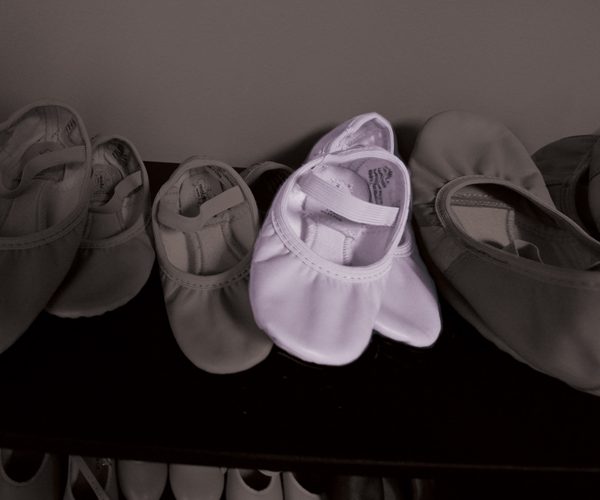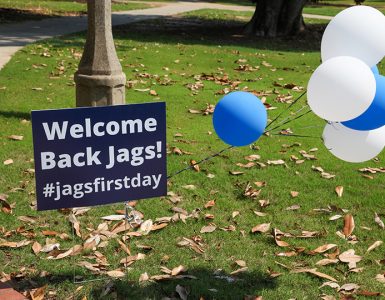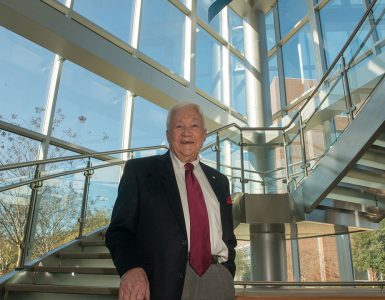Find three hobbies you love: One to make you money, one to keep you in shape and one to be creative.
It’s a popular life hack, a quick tip for a better, more balanced life.
For the multifaceted employees of Augusta University, some hobbies transcend categorization. They’re on stage, performing, competing and volunteering as worship leaders, ballet teachers, black belts and equestrians.
Their secret talents might seem at odds with their university day jobs, but each, they say, injects a creative energy into their work. They aren’t just hobbies, but opportunities: to give back, exercise a creative muscle, and become better people, not just employees.
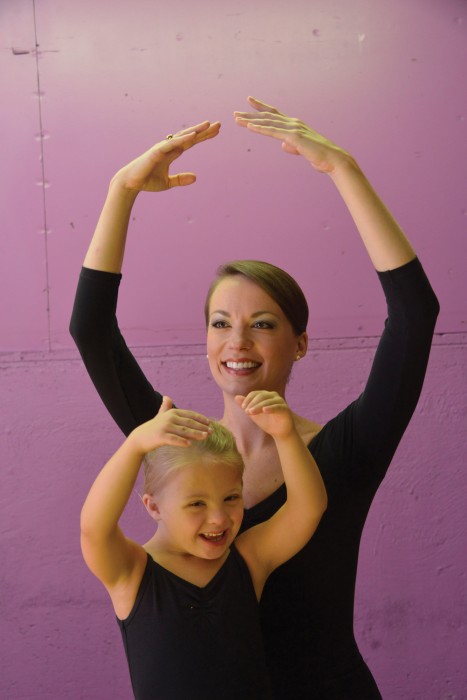
Mallory Lanier
Day job: Director of the Augusta University Low Vision Rehabilitation Clinic
Secret life: Ballet teacher to special needs children
Mallory Lanier started dancing at the age of five, the same age Rosemary Williams is today.
In pink tights and a blonde ballerina bun, Rosemary, called Rosie by family and friends, is one of Lanier’s returning ballet students. She attentively mimics Lanier’s every move, even if she occasionally struggles to hold a stretch or position.
Before she became a licensed and registered occupational therapist, Lanier was a dancer. Today, she uses both skills as director of Steps of Grace, the adaptive dance program she founded five years ago for special needs children. Her students have autism spectrum disorders, sensory processing disorder, Down syndrome, DiGeorge syndrome, cerebral palsy or developmental delays. Most have never taken a dance class.
“There are so many different ability levels, but they all come to learn ballet,” Lanier says. “My background in both dance and therapy is an asset. Sometimes I’ll have kids who start out watching. They won’t engage. Now they’ll follow along. Sooner or later, they’re running and jumping. They don’t realize its therapy because it’s fun.”
Many of the girls have difficulty with balance, coordination, integration, strength, problem-solving skills or social skills. Because of her Down syndrome, Rosie has low muscle tone. The ballet is strengthening, but that’s not why she does it.
“She just has so much fun,” her mother, Erin Williams, says. “Rosie loves it for the socializing as well as the dancing. It is also very good for her concentration and memory skills. I was surprised how quickly and well Rosie could learn the routines.”
Nearly 30 girls show up for one of four weekly classes. Five years ago, the program started with just five girls.
“My mom and I saw a segment on the ‘Today Show.’ A physical therapy program in New York was doing a special needs dance program,” says Lanier, who started teaching ballet and tap in high school and college. “That idea always stuck with me.”
Lanier went on to become an occupational therapist with a degree from the Medical College of Georgia. She was hired to direct the Augusta University Low Vision Rehabilitation Clinic, where she helps people with low vision increase their safety and independence. She also works with children of all ages and diagnoses at an Augusta occupational therapy practice.
“My boss said, ‘Mallory, you keep talking about it. Just do it.’ So I called a ballet school where I taught classes and asked to rent studio space,” she says. “By the end of the first year, we had 12 girls. It was just so fun. It was this thing I always wanted to do, and now I was doing it.”
The classes continue to grow, and along with them, the need for volunteers. “So many of our kids need one-on-one attention. A lot of the parents stay in the class to assist. I always say I’m going to limit my classes, but I can never say no.”
It’s a joy to watch Lanier work, Williams says. “She manages a roomful of three- to five-year-olds, plus multiple volunteers, and remains perfectly calm the whole time. I love Mallory’s vision that having a disability does not mean that dancing is out of reach. It is amazing to see how a roomful of little girls with widely varying disabilities can work toward a common goal and have so much success — and fun.”
The classes build toward a spring recital, when the young ballerinas take the stage in full costume.
“They’re on stage. They’ve got their hair and makeup done. The crowd loves them. They just clap and cheer,” Lanier says. “It’s a thrill. A lot of the parents never thought they would see their kids up on stage. It’s something typically developing kids do. Why not these kids? They’re doing things every little girl wants to do.”
Year after year, girls return a little bit stronger and excited to learn a new routine. “The focus is always on what’s ‘wrong’ with them, whether it’s at a doctor’s appointment, a physical therapy appointment or school,” Lanier says. “At dance class, they just dance.”
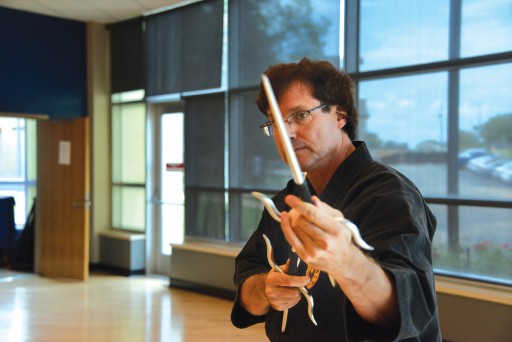
Mitchell Watsky
Day job: Dean of The Graduate School,
Professor of Cellular Biology & Anatomy
Secret life: 7th-degree black belt
For the entirety of his academic career, Mitchell Watsky has taught a different sort of class. In classrooms, gyms and student centers, his work as a teacher goes above and beyond his work as a professor of cellular biology and anatomy.
“I’ve been a karate instructor for over 30 years,” says Watsky, dean of The Graduate School. “Karate is intertwined in my academic career. Everywhere I’ve moved for my education, I’ve found students interested in learning martial arts.”
The same holds true at Augusta University, where Watsky helped formally charter the Augusta University Karate Club. They meet in the Health Sciences Campus Wellness Center for training and classes once a week.
“I’m passionate about introducing people to martial arts,” says Watsky, who took his first karate class to fulfill a physical education requirement at Emory University in the 1970s. By the time he was a senior, he was co-teaching the class.
Today, Watsky is a 7th-degree black belt with more than 30 years of experience in Ryu-Te, a martial arts form that emphasizes self-defense. Watsky trained with the late Seiyu Oyata, the renowned world-class martial arts practitioner who created the style and founded the International RyuTe Karate Association. Their form of martial arts is best known as a style originating from Okinawa that incorporates traditional weapons, like the “bo,” a 6-foot wooden staff; “kama,” a pair of sickles; and “manji sai,” handheld steel spears.
“It’s a traditional art, so we stay with the teachings of hundreds of years ago. It’s rooted in Okinawa’s history. The bo, for example, was traditionally used to guard palace gates,” Watsky says. “Each element is rooted in practical history.”
After 30 years, Watsky has been doing karate for so long that his “secret life” isn’t so secret.
“At meetings, though, they’ll joke with new faculty, ‘Watch out for Dr. Watsky. He’s a black belt,’” he says. “I tell students, ‘This is probably your only time in your academic career that one of your professors will invite you to punch him in the face.’”
Some of his students take him up on the offer. Membership in the Augusta University Karate Club is open to all students, regardless of level. Some come out of curiosity. Others enjoy having an experienced teacher on campus.
“It’s great to be able to teach what I have learned and for them to have the skills to defend themselves,” he says. “You see students who were once meek leave with a whole new confidence. One student, a young mother I remember, she was distressed to punch a punching bag. She wasn’t comfortable with the motion, the physicality and the aggression of it. She grew confident and more comfortable with practice. She changed. She started carrying herself differently, because she had confidence. That’s what martial arts does for you.”
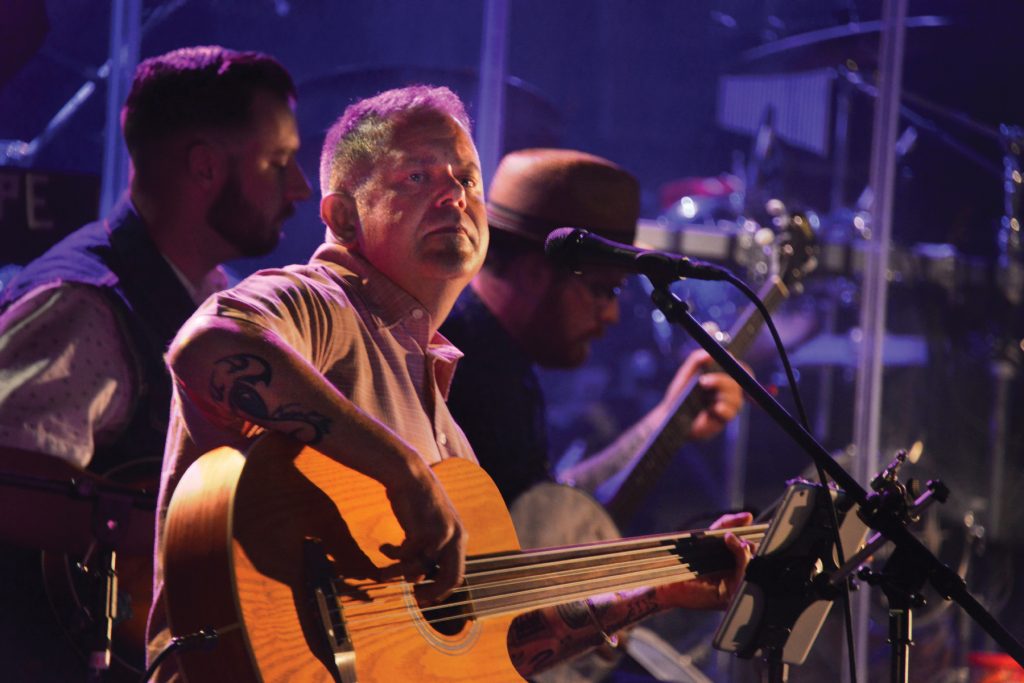
Jeff Mastromonico
Day job: Director of Instructional Design and Development
Secret life: Rock star worship leader
Jeff Mastromonico wears his secret on his sleeves. A bass guitar tattooed on his forearm is bookended by his favorite Bible verses, including the oft-quoted 1 John 4:8: “God is love.” The music staff just above the guitar incorporates notes to the Beatles’ “All You Need is Love.”
Beatles tour posters and Mastromonico’s own CDs hang opposite his desk in Payne Hall on the historic Summerville Campus. One of the oldest buildings in the arsenal quad is home to one of Augusta University’s newest, most innovative offices: Instructional Design and Development. Mastromonico came to Augusta University five years ago to manage the collective of designers and developers creating high-end mobile, desktop and multimedia applications. It was at about the same time he took his first job leading worship at Cedar Creek West, a growing satellite campus of the Aiken megachurch, Cedar Creek.
“A neighbor literally walked across the street with an apple pie and invited us to Cedar Creek,” Mastromonico says. “It was new and exciting. At the time, I was still playing with my band in clubs. I’d get home at 2 a.m. It was too much for my family. We were just having our second son, so we took a leap of faith.”
His youngest son, 6-year-old Alex, was given the middle name “West” to honor their new commitment to the church.
“Coming here was an opportunity to do something different as well,” he says. “Think about technology over the past five years and how much it has changed. Nobody knew what an iPhone was. Nobody had tablets. Now, it’s the majority of what we do. There’s been a lot of changes here.”
Members of a rotating band of 10 or 12 take the stage, including Ryan Buffett, a research assistant in Augusta University’s Vascular Biology Lab who plays keyboard with Mastromonico at the church.
“Playing with Jeff is awesome,” he says. “We have played so much together that there is a communication without even speaking sometimes. We can just look at each other and know what the other is going to do next. We are able to feel the music and enjoy ourselves.”
The church is a far cry from their old haunts, says Buffett, who used to fill in at gigs with Mastromonico’s band, Dispatch.
“It’s now been six years that I’ve been playing at Cedar Creek West, and I absolutely love it. I’ve found a church home and a church family,” he says. “Playing has truly become a sacrifice of worship every Sunday. It’s rewarding to look back and see that Jeff and I started playing totally different music on Saturday nights and now we work together to facilitate worship for people.”
Mastromonico still on occasion jams with his old bandmates, but prefers this new way of life.
“It’s the love of being able to serve,” he says. “This is a talent I’ve been given, and this is the way I want to use it. It helps me creatively. Managing folks here at Augusta University makes me a better worship leader. Being a worship leader has made me a better manager. They’re both eclectic and creative teams.”
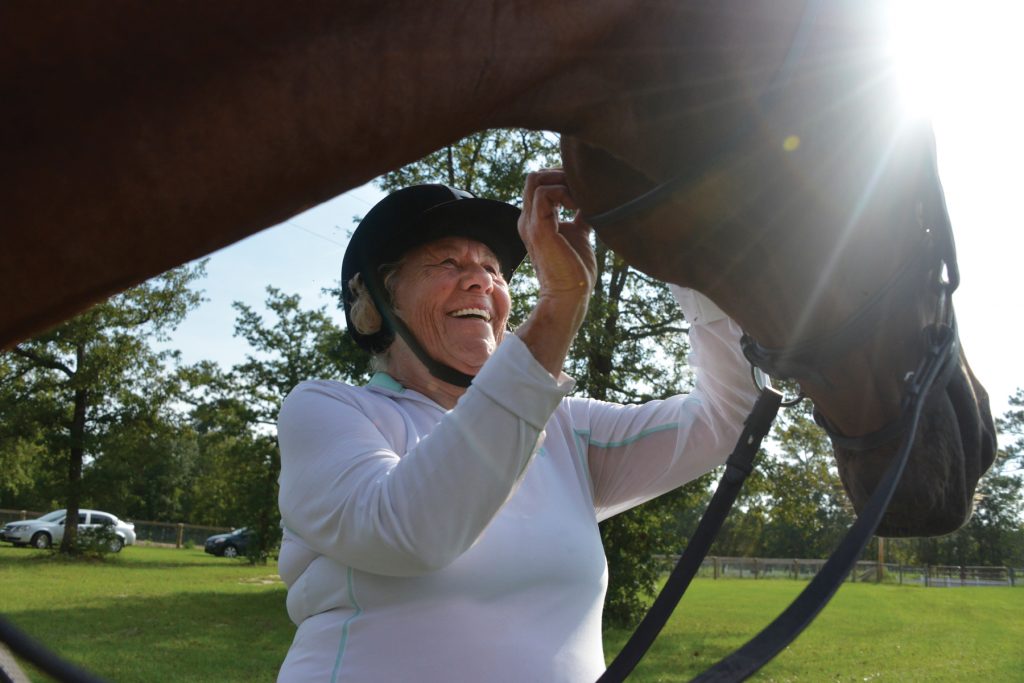
Martha Jennings
Day job: Assistant Professor of Physiological and Technological Nursing
Secret life: Competitive horse rider
There’s a temptation as you get older to keep all four feet on the ground, says Martha Jennings, who, at 68, deftly swings a leg over her towering horse, Nixon, for a riding lesson.
He’s a big boy – more horse than she thought she could handle – but when Jennings went searching for a perfect dressage horse to bring to her home in Williston, South Carolina, she “just couldn’t say no to this big, gentle sweetheart.”
Nine years ago, Jennings began teaching online courses to nurses pursuing their Doctor of Nursing Practice degrees. Augusta University’s program was one of the first of its kind offered in the nation and an early adopter of online classes.
“It’s the best of both worlds,” says Jennings, a nurse practitioner who teaches advanced courses in health care policy, management and information systems.
“I come to town for faculty meetings, but the majority of the interaction is online. I have more time to ride. Even at horse shows, I’m working.”
Several times a week, she saddles up Nixon for dressage practice. He’s been competing for years, but Jennings only started dressage last year.
“He still knows more than I do,” Jennings says with a laugh. She’s been a foxhunter for more than 30 years and is a member of the Why Worry Hounds Club in Aiken, but dressage is an entirely new challenge.
“Dressage is based originally on how war horses were trained,” says Laura Klecker, Jennings’ trainer and an award-winning rider in Aiken. “This sport is a really difficult discipline. The riding is very technical. If you commit to it, it can make you a better rider.”
Dressage has earned a new audience with the addition of music in recent years. Freestyle dressage routines are now frequently set to hip-hop and Top 40 songs and recorded for YouTube.
“It used to be very formal. There’s music and there’s attitude,” Jennings says. “That’s the audience draw. They call them the dancing horses.”
On a recent weekend, Jennings and Nixon qualified for the 2015 United States Equestrian Federation Regional Championships. She lost points on her walk. The littlest of things – from the cadence of a walk to the roundness of the topline of a horse’s neck – matter in dressage.
“I still have a lot to learn, but we started in earnest this year. Last year, we were training-level. This year, we’re first-level. You work your way up through the ranks,” says Jennings, who has shown in nearly a dozen competitions this year. “I look at all my scores as a learning experience. It’s an opportunity to get better, but it takes time and practice to move up.”
She’s patient. Jennings has waited a long time for this. She only took her first riding lesson at 30 or 31 years old.
Starting late had its problems, but learning to ride has given back so much more. “There’s a lot of crossover between teaching and learning. Both take a lot of practice and forgiveness. I can’t get upset when he does something wrong. Everybody has bad days. So do horses. I’ve learned that horses respond to kindness best, just like people do.”

